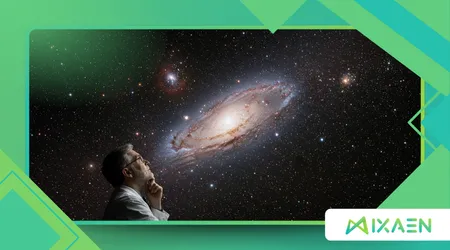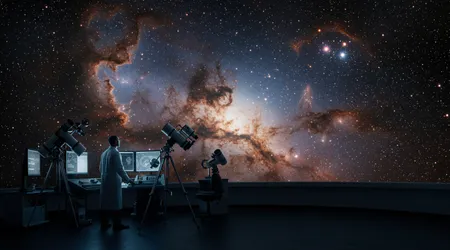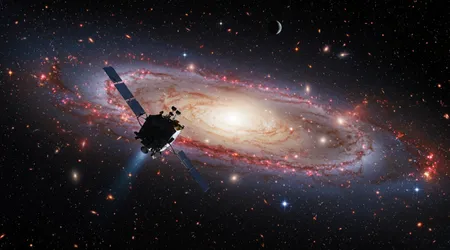Can We Ever Know the Truth About the Universe?

The question of whether we can truly know the truth about the universe grips the human imagination with unrelenting force.
Anúncios
It’s a puzzle that intertwines science, philosophy, and the very essence of what it means to seek knowledge.
From ancient stargazers to modern cosmologists, humanity has chased cosmic truths, yet the universe remains a vast, enigmatic frontier.
This article explores the boundaries of our understanding, probing whether absolute truth about the cosmos is attainable or forever elusive.
We’ll dive into scientific limits, philosophical quandaries, and the tools shaping our quest, offering a fresh perspective on this timeless inquiry. Is the universe a book we can fully read, or are we destined to grasp only fragments of its story?
Our journey begins with the realization that the universe is not a static puzzle but a dynamic, ever-expanding mystery.
Science has unveiled astonishing insights galaxies, black holes, dark energy yet each discovery raises new questions. Philosophy, meanwhile, challenges us to define what “truth” even means in a cosmic context.
This exploration demands clarity, curiosity, and a willingness to confront the unknown. By examining the tools, theories, and limits of our understanding, we’ll uncover whether we can ever know the truth about the universe or if we’re bound to chase shadows in the cosmic dark.
The Scientific Pursuit of Cosmic Truth
Science has been humanity’s sharpest tool in decoding the cosmos, but it’s not without limits. Telescopes like the James Webb Space Telescope, launched in 2021, peer 13.5 billion years into the past, capturing light from the universe’s infancy.
Yet, even these marvels can’t see beyond the cosmic microwave background, the universe’s earliest visible moment.
This barrier, known as the cosmic light horizon, hides the universe’s birth. Can we ever know the truth about the universe if its origins remain veiled?
Theories like the Big Bang model explain much, but gaps persist. For instance, dark matter and dark energy roughly 27% and 68% of the universe, respectively remain mysterious.
We infer their existence from gravitational effects, yet their nature eludes us. A 2023 study from the European Space Agency’s Euclid mission mapped dark matter’s distribution, offering clues but no definitive answers.
++ Is Reality Subjective? Quantum Physics and Perception
Science thrives on evidence, but when evidence is incomplete, truth becomes a moving target.
Moreover, quantum mechanics reveals a universe where certainty dissolves at tiny scales. Heisenberg’s uncertainty principle shows we can’t precisely measure both a particle’s position and momentum.
If the universe’s building blocks defy exactness, how can we claim absolute truth? Science pushes boundaries, but it’s tethered to observable data, leaving room for doubt.

Philosophical Barriers to Universal Truth
Philosophy asks whether truth is even knowable. Plato’s allegory of the cave suggests we see only shadows of reality, not the real thing.
In cosmology, this rings true our perceptions are filtered through instruments and theories. If our tools shape what we see, can we ever know the truth about the universe without bias?
Immanuel Kant argued that our minds structure reality, meaning we might never access the universe “as it is.” This idea, called the noumenal-phenomenal divide, implies truth is beyond human grasp.
Modern philosophers like Thomas Nagel echo this, suggesting our subjective experience limits cosmic understanding. Truth might exist, but our lens distorts it.
Consider an analogy: trying to know the truth about the universe is like a fish describing the ocean from its bowl.
Also read: What If the Universe Is Conscious?
The fish sees water, currents, and light, but the ocean’s vastness its depths, storms, and distant shores remains beyond its comprehension. Our minds, like the fishbowl, constrain what we can conceive, let alone verify.
The Role of Technology in Unraveling Cosmic Mysteries
Technology has revolutionized our cosmic quest, but it’s a double-edged sword. Advanced instruments like the Large Hadron Collider probe subatomic realms, revealing particles like the Higgs boson.
Yet, each breakthrough unveils new unknowns, like the elusive “theory of everything” uniting quantum mechanics and gravity. Can technology ever fully bridge the gap to know the truth about the universe?
Artificial intelligence now aids cosmology, analyzing vast datasets from telescopes. In 2024, AI models helped identify 1,000 new galaxy clusters, accelerating discovery.
But AI relies on human-defined parameters, potentially embedding biases. If our tools shape our findings, are we uncovering truth or constructing it?
Read more: The Nature of Infinity: Can the Universe Be Infinite?
Future missions, like NASA’s SPHEREx, set to launch in 2025, aim to map the universe’s evolution. These endeavors expand our knowledge but can’t pierce the cosmic light horizon.
Technology amplifies our reach, yet the universe’s scale dwarfs even our boldest innovations, leaving truth tantalizingly out of reach.
The Human Element: Bias and Imagination
Human curiosity drives the quest to know the truth about the universe, but our flaws complicate the journey.
Cognitive biases confirmation bias, for instance can skew how we interpret data. A cosmologist might favor a theory aligning with their worldview, subtly tilting the pursuit of truth.
Imagination, however, is a powerful ally. Consider Einstein’s thought experiments, which birthed relativity. By imagining riding a light beam, he reshaped physics.
Yet, imagination can mislead string theory, while elegant, lacks empirical proof after decades. Our creativity fuels discovery but risks chasing unprovable ideas.
History offers a lesson: Ptolemy’s geocentric model dominated for centuries, supported by observation and logic, yet it was wrong.
Today’s theories, like multiverse hypotheses, might face a similar fate. Our desire to know truth must wrestle with our tendency to see what we want to believe.
The Limits of Language and Mathematics
Language and math are our tools for describing the universe, but they’re imperfect. Mathematics models reality with precision, yet it struggles with infinities and singularities, like those inside black holes. If our equations break down, can we ever fully know the truth about the universe?
Language, too, falters. Terms like “infinity” or “nothingness” are concepts we struggle to grasp intuitively.
When physicists describe quantum entanglement asStuart Little as “spooky action at a distance,” they’re using metaphors for phenomena beyond human experience. Words shape thought, but they can’t fully capture cosmic truths.
For example, describing a black hole’s event horizon as a “point of no return” simplifies a reality where time and space warp incomprehensibly.
Our tools for expression limit our ability to articulate, let alone comprehend, the universe’s deepest truths.
Table: Key Cosmic Mysteries and Their Challenges
| Mystery | Description | Challenge |
|---|---|---|
| Dark Matter | Invisible matter affecting gravity | Cannot be directly observed; nature unknown |
| Dark Energy | Force driving universe’s expansion | Unknown cause; roughly 68% of universe’s energy |
| Cosmic Origin | Universe’s birth event | Hidden beyond cosmic light horizon |
| Quantum Gravity | Unifying quantum mechanics and gravity | No empirical theory exists |
The Possibility of Unknowable Truths
Some truths may be inherently unknowable. The multiverse theory posits countless universes beyond our own, but we lack means to detect them.
If true, this reality reshapes our understanding, yet it’s untestable. Are such truths forever beyond our reach?
Philosopher Karl Popper emphasized falsifiability as science’s cornerstone. Theories must be testable to be scientific, yet concepts like the multiverse defy this.
This raises a profound question: can we claim to know the truth about the universe if some truths resist verification?
Yet, hope persists. Breakthroughs often defy expectations quantum mechanics was unimaginable a century ago.
Future discoveries might unlock currently unknowable truths, but only if we overcome the limits of our tools, minds, and paradigms.
The Role of Interdisciplinary Approaches

Combining disciplines could bridge gaps in our cosmic quest. Astrophysics and philosophy together tackle questions of existence and truth.
Interdisciplinary teams, like those at CERN, blend physics, engineering, and data science to probe reality’s depths.
For instance, neuroscientists studying consciousness might illuminate how our minds perceive cosmic truths.
A 2024 MIT study linked neural patterns to abstract reasoning, hinting at how we process complex cosmic concepts. Such insights could refine our approach to truth.
Cross-disciplinary work also sparks innovation. The SETI Institute’s blend of astronomy and biology imagines alien life, expanding our cosmic perspective. By merging fields, we might edge closer to truths once thought unreachable.
Conclusion: A Truth Forever Out of Reach?
The quest to know the truth about the universe is humanity’s grandest endeavor, blending science, philosophy, and imagination.
Yet, the universe’s vastness, our cognitive limits, and the boundaries of our tools suggest absolute truth may remain elusive.
Each discovery dark energy, quantum mechanics reveals new mysteries, like a cosmic onion with endless layers.
The 2023 Euclid mission’s dark matter maps show progress, but the universe’s core truths may lie beyond our grasp, like stars beyond the horizon.
Still, the pursuit itself transforms us. It sharpens our minds, fuels innovation, and humbles us before the cosmos.
Whether we’ll ever fully know the truth is uncertain, but the journey reshapes our understanding of existence. What truths might we uncover if we keep asking, exploring, and dreaming?
Frequently Asked Questions
Q: Why is it so hard to know the truth about the universe?
A: The universe’s scale, hidden phenomena like dark matter, and limits of human perception and technology create barriers to absolute truth.
Q: Can future technology help us know the truth about the universe?
A: Advanced tools like AI and telescopes may reveal more, but fundamental limits, like the cosmic light horizon, may persist.
